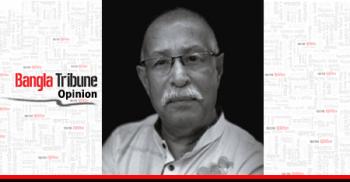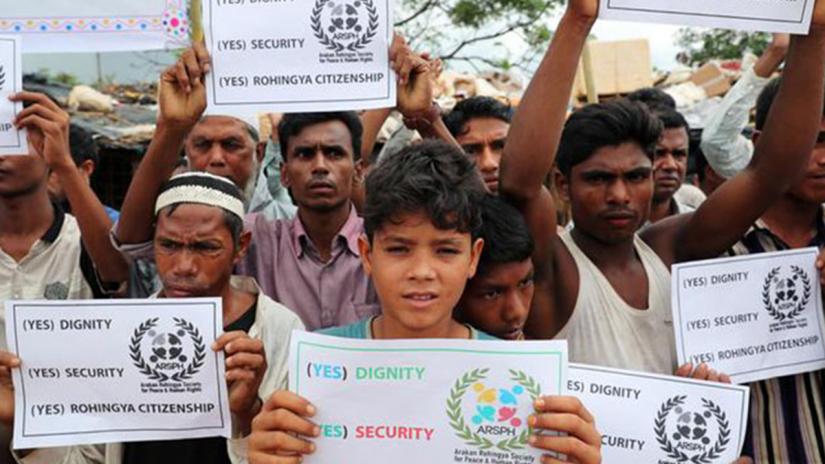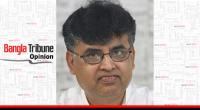 Prime Minister Sheikh Hasina tabled a four-point proposal at the United Nations General Assembly (UNGA) to solve the Rohingya crisis.
Prime Minister Sheikh Hasina tabled a four-point proposal at the United Nations General Assembly (UNGA) to solve the Rohingya crisis.
“The crisis is now lingering into the third year; yet not a single Rohingya could return to Myanmar due to [the] absence of safety and security, freedom of movement and overall conducive environment in Rakhine State of Myanmar,” Hasina lamented at New York.
Bangladesh Foreign Minister Dr AK Abdul Momen was eager to hold parleys with his counterparts in China and Myanmar, Wang Yi and Kyaw Tint Swe respectively, at the side lines of the United Nations General Assembly (UNGA) in New York, for safe and voluntary repatriation of Rohingya refugees languishing in sprawling camps in Cox’s Bazar.
Prospects of a diplomatic breakthrough in tripartite talks with China and Myanmar were marred, after Myanmar rejected a Chinese proposal to have a group of Rohingya genocide survivors visit the Arakan state to STUDY whether the situation was favourable for repatriation.
Aung Ko, Director General of the Political Affairs Department at Myanmar’s Ministry of Foreign Affairs categorically stated that they “will stick to the bilateral agreement to accept returning refugees after they are assessed.”
Two years ago on August 25, Myanmar security forces began a fresh military campaign of ethnic cleansing that drove an estimated one million Rohingyas to neighbouring Bangladesh.
Despite Myanmar’s agreement on the proposal for the repatriation and reintegration of Rohingya survivors, official efforts to implement it ran into hurdles. The Rohingyas' return was stalled several times in a decade.
There is indeed a trust deficiency in engaging with Myanmar, said Dr Momen in an exclusive interview with this journalist. He felt that the confidence and cooperation level should improve significantly to remove misunderstandings and suspicions among the two South Asian neighbours.
Dr Momen explained the present situation to the reporters on the eve of Prime Minister Sheikh Hasina’s visit to India, adding, “India is a good friend of both Bangladesh and Myanmar. It has investments in both countries. But if the Rohingya crisis prolongs, there may be pockets of radicalisation.” Myanmar in a bilateral agreement agreed to issue National Verification Card (NVC) after the return of Rohingyas to Arakan State but Bangladesh demanded that there should not be any restrictions on mobility for the Rohingyas returnees.
Myanmar in a bilateral agreement agreed to issue National Verification Card (NVC) after the return of Rohingyas to Arakan State but Bangladesh demanded that there should not be any restrictions on mobility for the Rohingyas returnees.
An estimated 500,000 Rohingyas who still remained in Arakan State are confined in several hamlets and guarded by Myanmar para-military forces and their freedom of movement is severely restricted.
Bangladesh was not surprised that the proposal for a non-military group of Association of Southeast Asian Nations – ASEAN, plus the inclusion of China and India to oversee the repatriation of refugees, supervise integration and rehabilitation was rejected by Myanmar.
Myanmar is a member of the ASEAN bloc and has friendly ties with its members including nine states ― Brunei Darussalam, Cambodia, Indonesia, Laos, Malaysia, Philippines, Singapore, Thailand, and Vietnam.
ASEAN countries are willing to cooperate to mitigate the Rohingya crisis. Malaysia, Thailand, and Indonesia are vocal about the genocide survivors and had extended help for the refugees living in Bangladesh.
Bangladesh proposed to Myanmar with a time limit of two years to complete the repatriation in cooperation with ASEAN Plus countries.
This was mooted at the tripartite dialogue in New York, after Myanmar refused to agree to a “safe zone” concept similar to the “peace corridor” for two million refugees from war-torn Syria.
The “safe zone” idea for Syrian refugees was proposed by Turkey with the leaders at the UN meeting and backed by Russia and Iran.
Dr Momen reaffirmed that the Myanmar government had moral responsibility to be proactive in their political commitment to ensure A voluntary, safe, and dignified repartition of Rohingyas languishing in the world's largest refugee camps in Cox's Bazar.
Saleem Samad, is an independent journalist, media rights defender, also recipient of Ashoka Fellow (USA) and Hellman-Hammett Award. He can be reached at [email protected].


